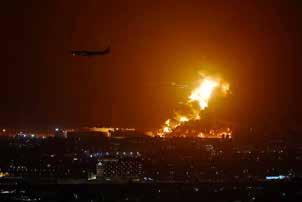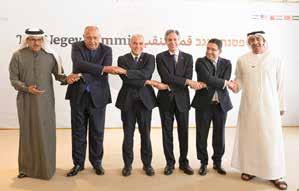
6 minute read
PROGRAM HIGHLIGHTS
At a time of high volatility in the regional security environment, Cruickshank & Dean Global Intelligence CEO, Paul Cruickshank and Director of Operations, Aimen Dean provided their perspective on the key geopolitical and security issues in the GCC countries and the wider Middle East as well as the implications for the business landscape.
THE SECURITY OUTLOOK FOR THE GULF IN Q2 2022
BY PAUL CRUICKSHANK & AIMEN DEAN
On the last Friday of March, as Formula One drivers began their afternoon free practice at Jeddah’s Corniche circuit, dark smoke began to drift across the sky. Less than ten miles away a fuel depot at Aramco’s North Jeddah Bulk Plant adjacent to the international airport was ablaze after being hit by a missile fired from Yemen by the Houthis.
It was the third time the plant had been struck by the Houthis, and the second time in less than a week. The facility, which stores diesel, gasoline, and jet fuel, is a critical node of Saudi Arabia’s energy infrastructure, holding more than a quarter of supplies, including the fuel necessary to operate a regional desalination plant.1 The missile attacks on Jeddah were part of a barrage of strikes by Houthis in the weeks before Ramadan against targets across the Kingdom, including, significantly, a desalination facility in Al-Shaqeeq on the Red Sea coast, to retaliate for mounting battlefield losses inside Yemen.2 U.S national security advisor Jake Sullivan condemned the aerial attacks and stated they were “clearly enabled by Iran.”3
Notwithstanding a two-month U.N. brokered ceasefire, which began on the first day of Ramadan, and which saw the warring parties in Yemen promise to “halt all offensive military air, ground and maritime operations inside Yemen and across its borders,”4 Saudi Arabia and its Gulf allies continue to be extremely concerned by the security threat posed by the Tehran regime and its network of proxies in the region, including Lebanese Hezbollah and an array of militia groups in Iraq. Iran’s Islamic Revolutionary Guard Corps (IRGC) has provided the Houthis with the capabilities to unleash drones, ballistic and cruise missiles, with Tehran supplying weapons components, training, expertise5, as well as encouragement. On the night of the attack on Jeddah, the faces of Houthi leaders were projected onto Tehran’s Azadi tower. 6
Two days later, when the foreign ministers of Bahrain, the UAE, Egypt, and Morocco met their Israeli and American counterparts at a historic summit at a resort in Israel’s Negev desert, countering the threat posed by Tehran was at the top of the agenda7. The Saudis did not attend the summit, but their views and concerns were voiced during the meetings. The Gulf countries are very concerned that a revival of the Iran nuclear deal will result in Iran having greater resources to destabilize the region. They are also troubled by the increasing signs that Washington, to get a deal over the finishing line, is willing to reverse the Trump administration’s 2019 designation of the IRGC as a foreign terrorist organization.
An Aramco oil depot was engulfed in flames after a missile attack claimed by Yemen’s Houthis. The strike came on the eve of the F1 Grand Prix of Saudi Arabia at the Jeddah Corniche Circuit.
Peter J Fox | Getty Images
The FTO listing was the final nail in the coffin for many multinationals and companies considering doing business with Iranian companies. Although the IRGC was already subject to multiple U.S. sanctions, the FTO designation introduced criminal liability for both U.S. and non-U.S. persons who knowingly provide material support to the IRGC and its agents8. With the IRGC controlling 20% to 40% of the Iranian economy9, the due diligence costs and business risks for companies doing business with Iranian entities were already prohibitive, but the possibility of criminal liability for senior executives has had a further chilling effect. This explains why Iran has made the delisting of the IRGC a key demand in the nuclear talks in Vienna10. It is a price Washington seems willing to pay, with the rationale that the pre-existing sanctions against the IRGC11 are sufficient to deter companies from doing business that directly benefits the IRGC. In return, the United States is seeking a firm commitment from Tehran that it will curtail its regional aggression and refrain from targeting Americans12. However, the Gulf countries and Israel believe it is naïve to believe that Tehran would change its behavior.
The Gulf powers are clear eyed that a deal will likely be done in Vienna. And that is why attention has now turned to bolstering regional security arrangements to constrain Iranian aggression. The Negev summit signaled a deepening partnership between the Gulf countries and Israel in countering Tehran and provided them an opportunity to jointly lobby the United States to do more. In recent weeks there have been intense discussions about air defense, with Israel and its regional partners working to formalize a communication system to alert one another of incoming drones from Iran and its proxies13 . As well as looking to bolster current defense agreements with Washington, Gulf countries have also been pursuing a written agreement with the United States that would create a Treaty commitment to provide defense support 14 .
Much will depend on how engaged the United States will remain in the region. In the last decade the United States, much less dependent than before on Middle Eastern oil, has been trying to pivot away from the region to focus on competing with a rising China. But the war in Ukraine is reminding the Americans of the strategic importance of the region. Not only are China and Russia competing with the United States for influence across the Middle East, but Middle Eastern producers will be crucial to replacing Western Europe’s dependence on Russian energy supplies and keeping the price at the pumps down. It is noteworthy that at the Negev summit, U.S. Secretary of State Blinken went to great lengths to reassure his interlocutors that the United States was fully committed to its allies in the region and that the UAE’s foreign minister Sheikh Abdullah bin Zayed publicly thanked him for making that commitment15 .
As for the war in Yemen, despite the best efforts of the United Nations, the current ceasefire is fragile and is unlikely to lead to durable peace. The Houthis’ patrons in Tehran remain ideologically committed to dominating the Middle East and, if a deal is done in Vienna, will get a cash windfall to fund their efforts. And Saudi Arabia, buoyed financially and geopolitically by the surge in oil prices, is not willing to tolerate the presence of a hostile power in Yemen that can threaten Saudi oil facilities and desalination plants with missiles. Saudi Arabia views the threat to its water supply as an existential threat.
All this means the security environment in the Gulf region will continue to be highly volatile in Q2 of 2022 and for the foreseeable future.

Secretary of State Antony J. Blinken participates in the Negev Summit with Israeli Foreign Minister Yair Lapid, Bahraini Foreign Minister Dr. Abdullatif bin Rashid Al Zayani, Egyptian Foreign Minister Sameh Shoukry, Moroccan Foreign Minister Nasser Bourita, and UAE Foreign Minister Sheikh Abdullah bin Zayed Al Nahyan on March 28, 2022 in Sde Boker, Israel.
[State Department Photo by Freddie Everett / Public Domain]
1 https://abcnews.go.com/International/wireStory/fire-saudi-city-ahead-f1-race-yemen-rebels-83671349 2 https://abcnews.go.com/Business/wireStory/saudi-arabia-yemen-rebels-target-energy-facilities-83560136 3 https://www.whitehouse.gov/briefing-room/ statements-releases/2022/03/25/statement-by-national-security-advisor-jake-sullivan-on-houthi-attack-against-saudi-arabia-3 4 https://osesgy.unmissions.org/press-statement-un-special-envoy-yemen-hans-grundberg-two-month-truce 5 https://www. csis.org/analysis/iranian-and-houthi-war-against-saudi-arabia ; https://www.washingtoninstitute.org/policy-analysis/yemens-southern-hezbollah-implications-houthi-missile-and-drone-improvements ; https://www.whitehouse.gov/briefing-room/statementsreleases/2022/03/20/statement-by-national-security-advisor-jake-sullivan-on-houthi-attack-against-saudi-arabia-2 6 https://abcnews.go.com/International/wireStory/fire-saudi-city-ahead-f1-race-yemen-rebels-83671349 ; https://twitter.com/AlinejadMasih/ status/1507510291537403906?s=20&t=2ob9IMDlyqsntICAe3j4ww 7 https://www.timesofisrael.com/at-negev-summit-allies-calmed-somewhat-by-us-recommitment-to-the-region/ 8 https://www.akingump.com/en/news-insights/legal-and-practical-considerations-of-thetrump-administration-s.html 9 https://www.bloomberg.com/news/articles/2019-04-09/why-the-u-s-has-targeted-iran-s-revolutionary-guard-quicktake 10 https://www.timesofisrael.com/washington-to-maintain-sanctions-on-irgc-even-with-iran-nuclear-deal-us-envoy-says/ 11 https://www.timesofisrael.com/washington-to-maintain-sanctions-on-irgc-even-with-iran-nuclear-deal-us-envoy-says/ ; https://www.cnn.com/2022/03/28/middleeast/mideast-summary-03-28-2022-intl/index.html 12 https://www.wsj.com/articles/iran-nuclear-deals-finalhurdle-is-lifting-terrorism-sanctions-on-revolutionary-guards-11647864073 13 https://www.nytimes.com/2022/03/26/world/middleeast/israel-arab-summit.html 14 https://www.bloomberg.com/news/articles/2022-03-30/gulf-oil-powers-seek-u-s-security-treaty-after-yemenstrikes 15 https://www.jpost.com/israel-news/politics-and-diplomacy/article-702907 ; https://www.state.gov/secretary-antony-j-blinken-joint-press-statements-at-the-conclusion-of-the-negev-summit



